Lewis Grassic Gibbon, (the pseudonym of J Leslie Mitchell (1901-1935)) is best known for his trilogy of Scottish novels, A Scots Quair, the story of Chris Guthrie, a young woman growing in Scotland in the early twentieth century. He wrote a number of other novels though, including two science fiction novels, which are often overlooked : Three Go Back (1932) and Gay Hunter (1934). In this post I will discuss Three Go Back.
The novel opens in mid-air, on an airship in fact, Magellan’s Cloud, beating steadily towards New York from Paris with twenty or so passengers, three of whom are central to the story:
- Clair Stranlay, a novelist, successful though controversial, still haunted by the loss of her lover, killed in the First World War, who is described by Mitchell thus : She was taller than most men liked, with that short-cut, straight brown hair which has strands and islets of red in it. And indeed, that red spread to her eyelashes , which were very long…and to her eyes, which had once been blue before the gold-red came into them.
- Dr. Keith Sinclair, an American political activist with The League of Militant Pacifists, who served on the Western Front as a doctor, and has been deported from Germany for attacking arms manufacturers such as the Krupps: Nearly six feet three inches , too long in the leg and too short in the body. All his life, indeed, there had been something of the impatient colt in his appearance. He had a square head and grey eyes set very squarely in it: high cheek-bones , black hair, and the bleached white hands of his craft”.
- Sir John Mullaghan, an arms manufacturer and therefore at odds with Sinclair
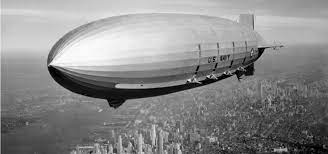
After an uneventful voyage a series of disturbing events occurs: the Atlantic ocean below the airship starting to boiling with “maelstroms rising from the depths”; the air becomes very cold; the airship’s wireless operator is unable to receive or send any messages; a full moon appears, five days before it is due; a mysterious island appears where no island should be in the Mid Atlantic; finally, as dawn breaks, the Magellan slams into a mountain which should not be there, falls into the ocean in flames and then explodes.
By a miracle Clair and Keith survive after falling into the sea, dressed only in their pyjamas.
The pebbles underfoot were slimily warm. From the sea a breath of of fog was rising, like a thin cigarette-smoke. Not a ship or boat was in sight, nothing upon or above the spaces of the Atlantic but a solitary cirrus low down in the north Eastern sky, Clair’s heels smarted. The American limped. ..She bent and scooped a double handful of water. She gasped. It was icily cold.
The pair meet Sir John, who has also survived and who tells them that he has seen no inhabitants, except a very large lion, but has also seen volcanoes on the horizon. At a loss to understand where they are, they set off in the hope of finding a village but after three days have not come across anyone. Half-starved, they manage to kill a deer, which they cook on a fire, and continue to tramp southwards, but become increasingly despairing of finding other people.
Taking refuge in a cave they encounter a tiger, not a tiger from their own time, a but sabre-tooth tiger :
And then the fire took hand. It spiralled upwards a long trail of smoke, red-glowing gas which bursts into crackling flame. There came a violent sneeze, a snarl, the thump of a heavy body crashing against the side of the cave in backwards leap. And then the three survivors of the Magellan’s Cloud saw – saw for a moment a bunched, barred, gigantic body, a coughing, snarling, malignant face. Then a rushing patter filled the cave. The fire died down. Beyond its light no eyes now glowed in the darkness.
Near the cave Keith finds a crude flint stone-axe and some human bones, including a skull, which Sir John identifies as that of a Neanderthal Man: “By rights it belongs to a race of humans that died out twenty thousand years.” Travelling along across a plain towards a lake they encounter a mammoth.
There the brute stood , real enough, feeding and watching them , with the brown night closing down behind him…The firelight went out across the gloaming shadows, splashing gently on the re-brown coat and bare, creased skull of the mammoth. it paused for a little on its eating, turning its trunk toward them. Then resumed.
And then the trio finally meet other people, a group of men chasing horses.
They ran in silence, tall and naked, the sunshine glistening on golden bodies, theur hair flying like the horses’ manes. Golden and wonderful against the hill-crest they ran, and the staring Sinclair drew a long breath
“Good God, they are running as fast as the horses!”
It was unbelievable. It was true. And while Sinclair and Sir John stared as now one hunter, now another, overtake his prey and spear it with whirling weapon, Clair Stranlay put her hands to her lips and whistle up through the evening that piercing blast learned long before in the streets of Battersea.
The score of naked hunters, all tall, surround them but do not threaten them, in fact they are amused at their tattered clothes. Curiously, Keith can understand some of their language. The hunter take them to the cave where they live.
There were perhaps two hundred or less human beings in that immense abandoned channel of the underground river. More than half were women and children. Some were grouped round the innumerable small fires, some lay flat and apparently asleep by those fires, some stood in groups – surely in gossip!.. Men and women were entirely naked…The golden-skinned nudes were as friendly as they were unreticent.
After having hit one of the women who was touching her, Clair apologises by kissing her on her mouth. “For answer the brown-haired woman put up her arms , held her head in a curious way and kissed her in return.”
Mitchell shows a sex difference in the way that the two men and Clair respond to the community they now find themselves part of. Keith is angry, almost hysterical; Sir John anxious for Clair’s safety and “honour” while Clair herself quickly adapts, already casting eyes at one of the hunters.
And now the three face reality; that they are not in Portugal or Patagonia or some other part of the world but have somehow been thrown at least twenty thousand years back into the past and are on a continent that was once situated in the Atlantic. Keith says that the cave people are speaking a version of Basque, the language spoken by his mother and are the ancestors of the Cro-Magnards .
Sir John suggests that two time loops touched at the moment of the submarine-earthquake and propelled the airship into the distant past: Clair finds the reality of their situation hard to grasp… or accept:
It’s a devil of a thing. I don’t think I can think about it much…if I can. At least not deliberately try to go mad…All this stuff about the time-spirals and retro-cognitive memory – maths has always given me a headache The world used always, I thought, to roll along a straight line called Time, instead of looping the loop with a thousand ghosts of itself. before and after it. And none of them ghosts, and none the reality.
Keith tries to reassure her: “At least we have all our lives to live – now, as in that time is not yet, that time is thousands of years ago. And they are our lives…And those people among whom we;ve come – if we can live their life , they’re livable companions, aren’t they?
But Claire becomes angry at her companions at the lies spread abroad in the C20th about humanity’s distant ancestors:
And I knew it – women always knew it. But you two and the thousands of others who led the world swore that men were natural murderers; you killed five million in France to prove your theories. All through history you’ve been doing it…The boy who died on the wire outside Mametz – he was one of these hunters. I saw his own face last night. and you and the world told him he was murderous beast by nature and ancestry!
Keith is forced to concede the truth of her of accusation: “You are right, Miss Stranlay. You are woman, for that matter, of fifty tortured centuries accusing us..”
Clair walks by the river where the children are paying and sees smoke rising from the cave and realises she’s hungry. She makes a decision. “Do it. Sometime you’ll be forced to to do it, Goodness, why wait til then.” She takes off her tattered pyjamas and goes naked like the cave people. It’s an acceptance by her that this is now her world, that there will be no escape or rescue. (Nakedness is a theme in Mitchell’s other science fiction novel, Gay Hunter) 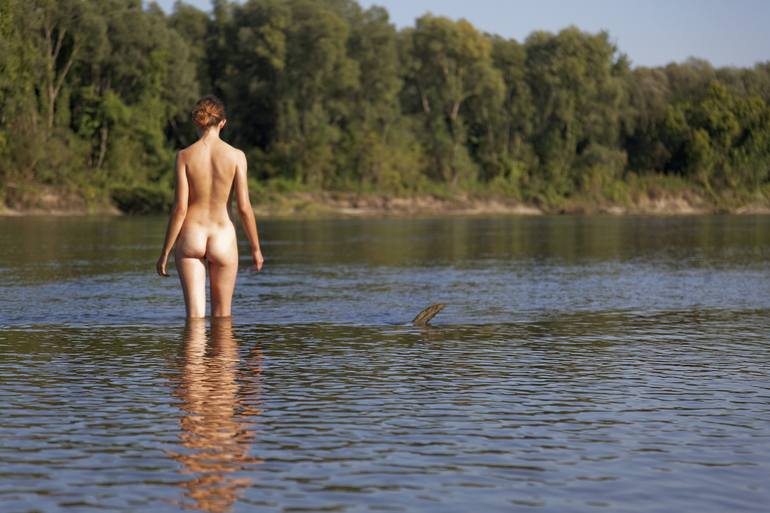
She goes into the cave where for the first time the women rose “like a flight of birds and settled around her. Unreasonably , abruptly , Clair felt not afraid. Standing smiling and nude, pearl and rose, under the touch of their friendly golden hands, she thought: ‘…as though i were freed from a horrible skin disease – free for the first time in my life. Oh, winter, don’t come too soon. I want to live!'”
On of the custom of the cave people is to choose mates for a season, with the women having the right to say no;
They mated as they chose; those golden women@ they bore children, many and quickly, unless they tired of mating;they died in great numbers in childbirth, they and their children.And they lived free from the moment they were born till the moment when that early death might overtake them… The veil, the priest , the wedding ring, the pornographic novel, and all the unclean drama of two beasts enchained by sex and law and custom were things beyond comprehension of the childlike minds in those golden heads or the vivid desires of those golden bodies…Golden children in the dawn of time, they paired in the afternoon and in pairs melted into the east.
Then Clair is chosen by a grey-eyed hunter, Aerte, and does not reject him, to the shock of her two companions. She goes off with him, partly with the intention of having a child, explaining to Keith: “I want one. We’re here for life – however long our live may last..and we can change things–change things so that babies won’t die so readily…Oh, I’ll hate the bother of it. but I”ll have one – next spring.”
After getting lost Clair meets another kind of human being;
It was a male, with the bigness of a gorilla and something of its form. It was hung with dun-red hair; crouched forward, its shoulders were an immense stretch of arching muscle and bone. its gnarled hand almost touched the ground. it smelt. it stared at her filmily, and a panting breath of excitement came from its open jaws. A Neanderthaler!
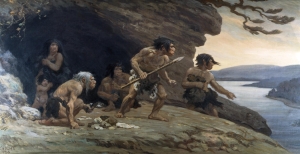
She manages to scare it off, but she and Keith discover that he is part of a group. They attack them but are rescued by the hunters and Clair spends another night with Aerte. “She has been lost and she was found and he had gone to her and taken her with a simplicity that had wrung from Clair no protest or repulsion. Only pity.”
With the weather getting steadily colder and game growing scarce, the cavemen set off through a valley to find a new hunting ground although it means passing close to the Neanderthals. Too close, for they are seen… To save their friends Clair and Keith stay behind as the rear guard and come under fierce attack.
Twice they had come, and twice broken and shambled away downwards in screaming flight. Cla’r s spear was gone, the head embedded in a beast man’s chest. Sinclair leant against the canyon wall, his right arm hannging by a pinch of skin, blood pouring from a dreadful stomach wound. ..She felt suddenly serene and assured. “Oh, my dears, it isn’t long now!. They are coming again…”
They die. But then awake , unharmed, back in C20th in the Azores and try to make sense of it all.
You can read the novel online here
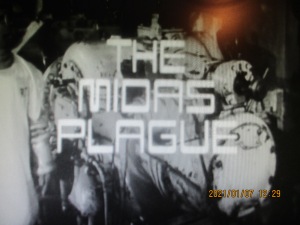 This episode is a comic satire on the consumer society. Based on a short story written by Frederick Pohl in 1954, it follows in the vein of his most well-known novel The Space Merchants (1952), also a satire on consumerism, which was set in a future in which advertising relentlessly sells pointless products to the public, including the idea of a colony on Venus.
This episode is a comic satire on the consumer society. Based on a short story written by Frederick Pohl in 1954, it follows in the vein of his most well-known novel The Space Merchants (1952), also a satire on consumerism, which was set in a future in which advertising relentlessly sells pointless products to the public, including the idea of a colony on Venus. 


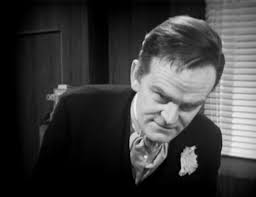
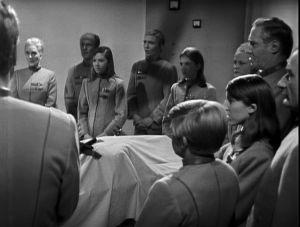
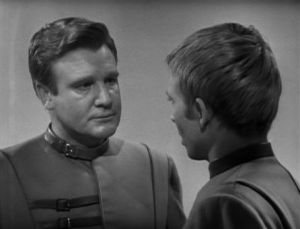

 ike many young people in the late 1950s Brunner was a member of Campaign for Nuclear Disarmament, founded in 1958 to campaign against the H- Bombs posssessed by Britain the USA and Soviet Union, which many feared would end civilisation if they were ever used in a war. For a time CND attracted tens of thousands on its “Ban the bomb” marches. Brunner organised CND caravans into Europe, and wrote several songs for the movement, including the
ike many young people in the late 1950s Brunner was a member of Campaign for Nuclear Disarmament, founded in 1958 to campaign against the H- Bombs posssessed by Britain the USA and Soviet Union, which many feared would end civilisation if they were ever used in a war. For a time CND attracted tens of thousands on its “Ban the bomb” marches. Brunner organised CND caravans into Europe, and wrote several songs for the movement, including the 

 “Sucker Bait” was a novella first serialised in the February and March 1954 issues of Astounding Science Fiction, and reprinted in the 1955 collection The Martian Way and Other Stories.
“Sucker Bait” was a novella first serialised in the February and March 1954 issues of Astounding Science Fiction, and reprinted in the 1955 collection The Martian Way and Other Stories.




 Written by
Written by 



 This was broadcast on 18th October 1965.
This was broadcast on 18th October 1965.

 First published in the Soviet Union in 1959, the authors compiled accounts from 29 Soviet scientists on what life might be like in 2007. It is unlikely that such a volume would have been translated and published in the West ten years previously, but the Soviet launch of Sputnik, the first satellite sent into earth orbit, stunned the world in October 1957. The Soviets followed this with further satellite launches, and then sending the first man into space, Cosmonaut Yuri Gagarin, who orbited the world on 12 April 1961. Previously regarded as a country barely emerged from peasantry, the Soviet Union now seemed to be at the forefront of scientific discovery and development, and hence became the focus of intense interest.
First published in the Soviet Union in 1959, the authors compiled accounts from 29 Soviet scientists on what life might be like in 2007. It is unlikely that such a volume would have been translated and published in the West ten years previously, but the Soviet launch of Sputnik, the first satellite sent into earth orbit, stunned the world in October 1957. The Soviets followed this with further satellite launches, and then sending the first man into space, Cosmonaut Yuri Gagarin, who orbited the world on 12 April 1961. Previously regarded as a country barely emerged from peasantry, the Soviet Union now seemed to be at the forefront of scientific discovery and development, and hence became the focus of intense interest. first chapter “Learn to Dream” begins with a vist to the study of Alexander Nikolaievich Nessmayanov. “On a huge desk stood a bronze Atlas bearing on his shoulders a gleaming globe. Portraits of Russian scientists hung on the walls. In one corner a wooden bust of lenin, smiling , the work of the well-known sculptor S. T. Konienkov…”
first chapter “Learn to Dream” begins with a vist to the study of Alexander Nikolaievich Nessmayanov. “On a huge desk stood a bronze Atlas bearing on his shoulders a gleaming globe. Portraits of Russian scientists hung on the walls. In one corner a wooden bust of lenin, smiling , the work of the well-known sculptor S. T. Konienkov…” In Chapter 28 “In The Lunar City” Nicholas Alexandrovitch Varvarov describes what a Soviet permament base on the Moon might look like:
In Chapter 28 “In The Lunar City” Nicholas Alexandrovitch Varvarov describes what a Soviet permament base on the Moon might look like: